Mercedes-Benz Arena Stadium in Germany: A World-Class Sporting Venue
The Mercedes-Benz Arena is a world-renowned stadium located in Stuttgart, Germany. It is the home stadium of Bundesliga team VfB Stuttgart, and has a seating capacity of just over 60,000. The stadium has undergone several renovations, most recently between 2009-2011, to become the modern and iconic structure it is today.
The history of the Mercedes-Benz Arena dates back to 1933, when it was originally built as the Neckarstadion. Since then, the stadium has hosted numerous international events, including the 1974 FIFA World Cup and the 1988 European Football Championship. The stadium has also been used for concerts and other cultural events, making it a versatile and important venue for the city of Stuttgart.
Key Takeaways
-
- The Mercedes-Benz Arena is a world-renowned stadium located in Stuttgart, Germany, with a seating capacity of just over 60,000.
- The stadium has undergone several renovations since it was originally built in 1933, and has hosted numerous international events, including the 1974 FIFA World Cup and the 1988 European Football Championship.
- In addition to being the home stadium of Bundesliga team VfB Stuttgart, the Mercedes-Benz Arena is also used for concerts and other cultural events, making it a versatile and important venue for the city of Stuttgart.
History of Mercedes-Benz Arena
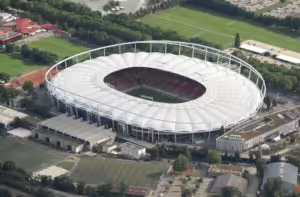
Construction and Opening
Mercedes-Benz Arena, formerly known as Neckarstadion, is a stadium located in Stuttgart, Baden-Württemberg, Germany. The construction of the stadium began in 1933 and was completed in 1939. The stadium was built to host the annual Reichsarbeitdienst (RAD) Labour Service festival. The stadium was designed by Paul Bonatz and Fritz Scholer, and it had a capacity of 80,000 spectators.
The stadium was officially opened on July 23, 1933, with a match between VfB Stuttgart and FC Schweinfurt 05. The opening ceremony was attended by high-ranking Nazi officials, including Adolf Hitler and Joseph Goebbels. The stadium was used for various events during the Nazi era, including political rallies and military parades.
Major Renovations
The stadium underwent major renovations in 1993 and was renamed Gottlieb-Daimler-Stadion. The renovations included the installation of a new roof and the construction of a VIP area. The stadium’s capacity was reduced to 54,767 spectators.
In 2008, the stadium was renamed Mercedes-Benz Arena after the German car manufacturer reached a deal with the arena management to rename the venue for 20 years. The stadium underwent further renovations between 2009 and 2011, which included the installation of new seats, the construction of new VIP boxes, and the expansion of the stadium’s hospitality areas. The stadium’s capacity was increased to 60,449 spectators.
Historical Events
The Mercedes-Benz Arena has hosted numerous historical events over the years. The stadium was the venue for Germany’s first international football match after World War II in 1950, which was played against Switzerland. The stadium has also hosted matches during the 1974 and 2006 FIFA World Cups.
In addition to football matches, the stadium has hosted several other events, including concerts, religious gatherings, and political rallies. The stadium was the venue for a speech by former US President Barack Obama in 2016.
Overall, the Mercedes-Benz Arena has a rich history and has played an important role in the cultural and sporting life of Stuttgart and Germany.
Design and Architecture
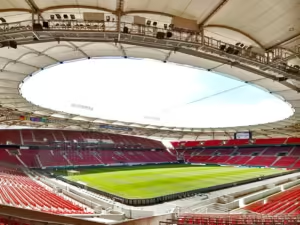
Seating Capacity
Mercedes-Benz Arena Stadium, located in Stuttgart, Germany, has a seating capacity of 60,449. The stadium is home to VfB Stuttgart, a German Bundesliga football team. The seating arrangement includes a total of 40,000 seats for general admission, 18,000 seats for premium guests, and 2,449 business seats.
Architectural Style
The stadium was originally built in 1933 and was known as Gottlieb Daimler Stadion. It was designed by Paul Bonatz, a German architect. The stadium underwent a major renovation in 2011 and was designed by the architecture firm HOK. The new design features a modern, sleek look with a retractable roof that allows for natural light to enter the stadium. The stadium’s exterior is made of a combination of glass, steel, and concrete, giving it a futuristic appearance.
Sustainability Features
Mercedes-Benz Arena Stadium is designed with sustainability in mind. The stadium’s roof includes solar panels that generate electricity, reducing the stadium’s carbon footprint. The stadium also features a rainwater collection system that is used for irrigation and toilet flushing. The stadium’s lighting system is energy-efficient, and the stadium’s waste management system is designed to reduce waste and increase recycling.
Overall, the design and architecture of Mercedes-Benz Arena Stadium is impressive and modern, with a focus on sustainability. The stadium’s seating capacity, architectural style, and sustainability features make it a world-class venue for football matches and other events.
Events and Usage
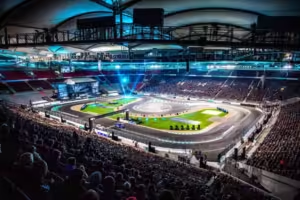
The Mercedes-Benz Arena Stadium in Germany is a highly versatile venue that hosts a wide range of events throughout the year. From sports events to concerts and shows, the stadium is a popular destination for locals and tourists alike. Here are the different types of events that take place at the Mercedes-Benz Arena Stadium.
Sports Events
The Mercedes-Benz Arena Stadium is home to two of Germany’s top sports teams, VfB Stuttgart (football) and Eisbären Berlin (ice hockey). The stadium has hosted numerous sports events over the years, including the 2007 World Men’s Handball Championship, the 2010 World Figure Skating Championships, and the 2015 World Wrestling Championships. The stadium is equipped with state-of-the-art facilities, making it an ideal venue for hosting sports events of all kinds.
Concerts and Shows
The Mercedes-Benz Arena Stadium is also a popular venue for concerts and shows. Some of the biggest names in the music industry have performed at the stadium, including Rihanna, Beyoncé, and Coldplay. The stadium has also hosted a number of popular shows, such as Cirque du Soleil and Disney On Ice. With a seating capacity of up to 17,000 people, the stadium can accommodate large crowds, making it a popular destination for both performers and fans.
Other Events
In addition to sports events and concerts, the Mercedes-Benz Arena Stadium hosts a variety of other events throughout the year. These include trade shows, conferences, and exhibitions. The stadium’s versatile facilities make it an ideal venue for hosting a wide range of events, from small meetings to large-scale exhibitions.
Overall, the Mercedes-Benz Arena Stadium is a highly versatile venue that caters to a wide range of events. With state-of-the-art facilities and a prime location in the heart of Germany, the stadium is a popular destination for both locals and tourists alike.
Visitor Information
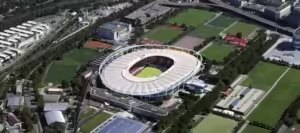
Location and Access
Mercedes-Benz Arena is located in the Bad Cannstatt district of Stuttgart, Germany. The stadium is easily accessible by public transportation, with a number of bus and train lines stopping nearby. The nearest train station is Neckarpark, which is just a short walk from the stadium. Visitors can also take advantage of the stadium’s on-site parking facilities, which offer ample space for cars and buses.
Ticketing and Tours
Tickets for events at Mercedes-Benz Arena can be purchased online, over the phone, or in person at the stadium’s box office. The stadium offers a range of ticket options, including single tickets, season tickets, and group tickets. Visitors can also take a guided tour of the stadium, which offers a behind-the-scenes look at the stadium’s facilities and history.
Facilities and Services
Mercedes-Benz Arena offers a range of facilities and services to visitors, including a variety of food and beverage options, merchandise shops, and restrooms. The stadium is also equipped with state-of-the-art audio and video technology, ensuring that visitors can enjoy a high-quality viewing experience. Additionally, the stadium is fully accessible to visitors with disabilities, with designated seating areas and facilities available.
Economic and Cultural Impact
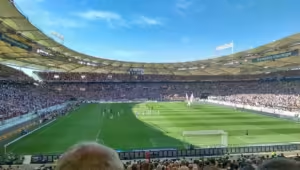
Local Economy
The Mercedes-Benz Arena Stadium in Stuttgart, Germany, has had a significant impact on the local economy since its opening in 1933. As per the Georgia World Congress Center Authority report, the stadium has generated millions of euros in revenue over the years. The stadium has also been a major source of employment for the local population, with hundreds of people working in various capacities such as security, maintenance, and hospitality.
The redevelopment of the Mercedes-Benz Arena Stadium ahead of the Euro 2024 tournament is expected to generate even more revenue for the local economy. As per stadiumdb.com, the revamp of the stadium would cost €65 million and would include new players’ facilities, media working areas, and expanded hospitality to generate greater revenue. The modernization of the stadium is also expected to attract more tourists to the city, thereby boosting the local economy.
Cultural Significance
The Mercedes-Benz Arena Stadium is not just a sports venue but also a cultural landmark in Stuttgart. The stadium has hosted several major events over the years, including concerts, festivals, and sporting events. The stadium has also been a venue for cultural events such as the Stuttgart Beer Festival, which attracts thousands of visitors every year.
The stadium’s cultural significance is further enhanced by the fact that it is home to the VfB Stuttgart football club, which has a rich history and a loyal fan base. The club’s success over the years has played a significant role in shaping the city’s identity and culture.
In conclusion, the Mercedes-Benz Arena Stadium has had a significant economic and cultural impact on Stuttgart. The stadium’s redevelopment ahead of the Euro 2024 tournament is expected to generate even more revenue for the local economy and attract more tourists to the city. The stadium’s cultural significance is further enhanced by its role as the home of the VfB Stuttgart football club.
Frequently Asked Questions
What is the seating capacity of the Mercedes-Benz Arena in Stuttgart?
The Mercedes-Benz Arena in Stuttgart has a seating capacity of just over 60,000 spectators.
Are there any upcoming renovations scheduled for the Mercedes-Benz Arena in Stuttgart?
There are no upcoming renovations scheduled for the Mercedes-Benz Arena in Stuttgart as of June 2024.
What are the parking options available at the Mercedes-Benz Arena in Stuttgart?
There are several parking options available at the Mercedes-Benz Arena in Stuttgart. Visitors can park in the P1, P2, P3, P5, and P6 parking lots located around the stadium. The P1 and P2 lots are reserved for VIP parking, while the P3, P5, and P6 lots are available for general parking.
Which sporting events will the Mercedes-Benz Arena in Stuttgart host during EURO 2024?
The Mercedes-Benz Arena in Stuttgart will host five matches during UEFA EURO 2024. These matches are Slovenia vs Denmark on June 16, 2024, Germany vs Hungary on June 19, 2024, Scotland vs Portugal on June 23, 2024, one Round of 16 match on June 27, 2024, and one quarter-final match on July 3, 2024.
Is the Mercedes-Benz Arena in Berlin hosting any major events this year?
The Mercedes-Benz Arena in Berlin is a separate venue from the Mercedes-Benz Arena in Stuttgart. As of June 2024, there are no major events scheduled at the Mercedes-Benz Arena in Berlin.
Which football club is the primary tenant of the Mercedes-Benz Arena in Stuttgart?
The primary tenant of the Mercedes-Benz Arena in Stuttgart is VfB Stuttgart, a professional football club that competes in the Bundesliga, the top tier of German football.
Read More:
Red Bull Arena RB Leipzig Stadium: All You Need to Know
Volksparkstadion: History, Capacity, and Location
Stadium Deutsche Bank Park: A Comprehensive Guide
Veltins-Arena: The Home of Schalke 04
Tags: History of Mercedes-Benz Arena, Is the Mercedes-Benz Arena in Berlin hosting any major events this year?, What are the parking options available at the Mercedes-Benz Arena in Stuttgart?, What is the seating capacity of the Mercedes-Benz Arena in Stuttgart?, Which football club is the primary tenant of the Mercedes-Benz Arena in Stuttgart?, Which sporting events will the Mercedes-Benz Arena in Stuttgart host during EURO 2024?